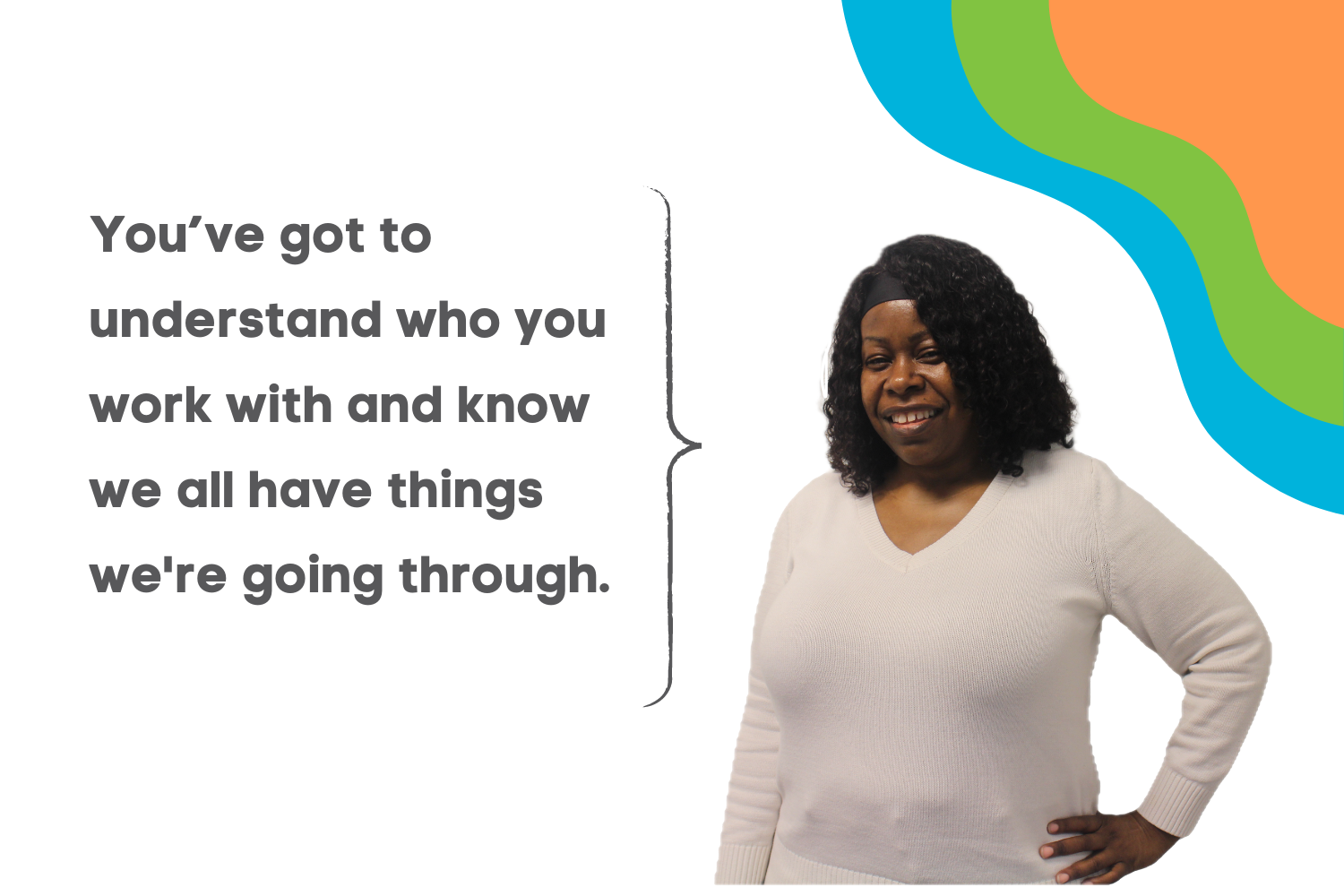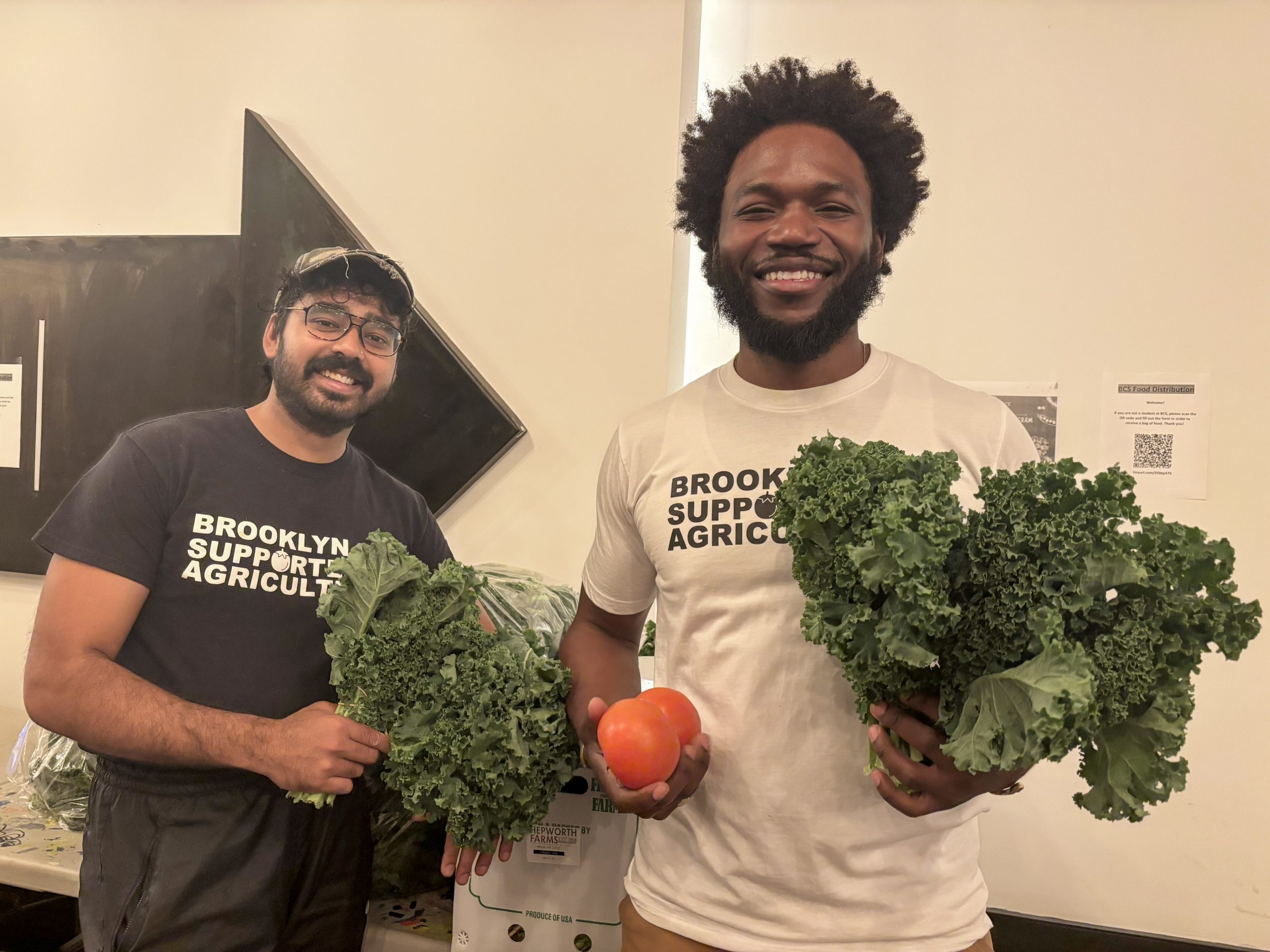Staff Spotlight: Kim Walker, Work Readiness Program

How did you find out about BCS?
I was out of work, and my daughter–my 23-year-old daughter–was helping me look for employment. And she said, “Mommy, they have an open house in Brooklyn working with people with intellectual and developmental disabilities. You’ve been doing that for so long. I already made an appointment for you to come down here.” It was an open house, and they interviewed me. They were looking to fill two positions, and the directors were there. They decided that I was a fit for the role I have now because I have over 25 years of experience working with intellectual and developmental disabilities. It’s been easy for me, and Ramona is a great support, and that’s what I look for at any job. So I’ve been here since March of last year.
What’s your official title?
I’m the Employment Specialist/Job Developer.
How did you first get started in the field, and what kind of work were you doing before you came here?
Right before I came here, I was working at an MLTC Advantage Long Term Care Insurance Company–that was different; that was business. But when I graduated from St. John’s University in 1994, I was sending my resume out. I have a psychology degree, and I always wanted to give back. I have a cousin who has a developmental disability, and I saw him strive and progress and do well. So, I sent my resume out to different places and got a job at YAI, which, back then, was like the premier place.
What does YIA stand for?
It was called the Young Adult Institute, but now it’s the National Institute for People with Disabilities. I started there as a Direct Care Counselor in the day program, and then they had an opening at YAI in the Crisis Intervention Program, where I was able to write behavior plans, run groups about behavior, and work with adults and children who had intellectual developments or disabilities.
Later, I went to be an Assistant Manager in a group home. That was interesting. It was always about the individuals. Whatever issues you have, you keep them at the door. That was the first time I had to supervise people. I really just like to give back, and working with this population, I like to see progress. I like to see them grow.
What are you responsible for in your current position?
I work in the Supportive Work Readiness Program for adults with intellectual disabilities. I run a group here where we teach them work readiness skills. It’s soft skills like getting to work on time, respecting your co-worker, dressing appropriately, making sure you’re clean, and knowing how to interview when you get a job. Sometimes, it takes them a little longer. You have to have patience in this field or in any social service area. I tell people I have the patience of a saint.
I have a coworker now, Essence, who works with me; she started in April. Now we have a volunteer site that’s part of the program for them to do hands-on learning at the Burlington at the Atlantic Terminal mall. We take half of them one day, and we go twice a week. Then, we observe them and do hands-on learning with them. They interact in a group, and it teaches them real life experiences. I give them examples, just so they get to know me and I know them.
How many people are usually in the group at one time?
We have 11 right now.
Do the participants sign up on their own, or does someone else send them your way?
We get referrals from hospitals or other institutions. They do an evaluation, and we get them from [Adult Career and Continuing Education Services-Vocational Rehabilitation]. We get them from different places; we go to resource fairs to get clients and give families information. Now, the New York City public schools have increased the age that [people with disabilities] can stay at the schools, so we’re up against that, because they’re there all day but they’re only here two hours. What would you choose as a parent? You want them to be there all day. But this is a good program. I’ve seen [participants] excel. I’m very proud of them, and I tell them that all the time.
Do you keep up with many of the people who’ve come through the program?
We had one participant since I started here who left, and now he’s working in BCS’s Pre-Vocational program. One day, I was covering for my coworker who was out, and I saw him with his group going to do volunteer services at Cookies. In my past experiences with different clients along the years, I’ve seen the progress. I’ve seen people who lived in supportive housing and needed staff then go live on their own. I had one individual and his son. They used to live in an apartment building, and now they have their own place.
Is the program open to people of all ages?
Our program is 18 to 64. Our oldest is just turning 65. She just made the cut.
What are the most rewarding aspects of the job?
Just to see them grow and achieve and look forward to the group.
And the most challenging parts?
Sometimes, the group members don’t try, and it could be anything that’s troubling them that they don’t want to talk about. We have one individual who I know knows what to do, but he was out for a little while. He’s come back, and I told Essence, “I don’t know why he doesn’t want to really answer the questions. He says he doesn’t know, and I know he knows.” So, that’s been a little frustrating, because we want them to grow; we want them to eventually work. We push them, and I’m a little firm, but I’m nice. You can be firm and nice. Sometimes they have attitudes, just like anybody else, but I don’t hold a grudge. Like, the next day is a new day. Even the next five minutes are different. You’ve got to understand who you work with and know we all have things we’re going through.
Can you give me some insight into how the group works?
We’ll have discussions. For example, today, we talked about how to get off on the right foot. That was the name of the discussion. So we talked about how you are supposed to be when you first get a job. Then, once we talk about that, they interact, and we do role-play scenarios and ask for volunteers. Sometimes they don’t want to volunteer, and I’ll say, “If this was work and your boss asked you to volunteer for a project, you would have to, right?” So, we try to connect everything to work, because that’s the goal. Even for coming on time, if I notice someone is tardy often, I don’t address it in front of the group, but the next day I’ll talk to everyone about being on time. If anybody’s disrespectful, we’ll talk about showing each other respect, because that’s what you’re supposed to do at work.
Every month we do mock interviews, and I really set it up like it is an actual interview in the waiting area. I call them one by one. I pick about five questions, and I go through them and ask them, and they write their answers down. Last time, I reviewed some of the better answers, and I said, “You all did well, but you can work on some things.” The main question is just, “Tell me about yourself.” And sometimes they go left but sometimes they hit it right on the nose. Some of the questions are a little harder, like “What are your weaknesses and what are your strengths?” So we kind of coach them through that, and some of them are good. Some of them have some work to do, but it’s all about where the client is. Nobody’s the same.
How do you like BCS overall?
I really like it. I have great support from Ramona and Rose, great co-workers and colleagues, really have no issues. We come together to get things done, and that’s who I am. I’m about being a team player, and we teach this particular group of participants that every day.
Top Viewed Posts
Youth Art Programs
Program Spotlight: Day Habilitation
BCS Volunteers Spring into Action for Brooklyn
Recent News

Participant Spotlight: Ann Salmon, PROS
July 16, 2025
Read More
 SUBSCRIBE
SUBSCRIBE 











